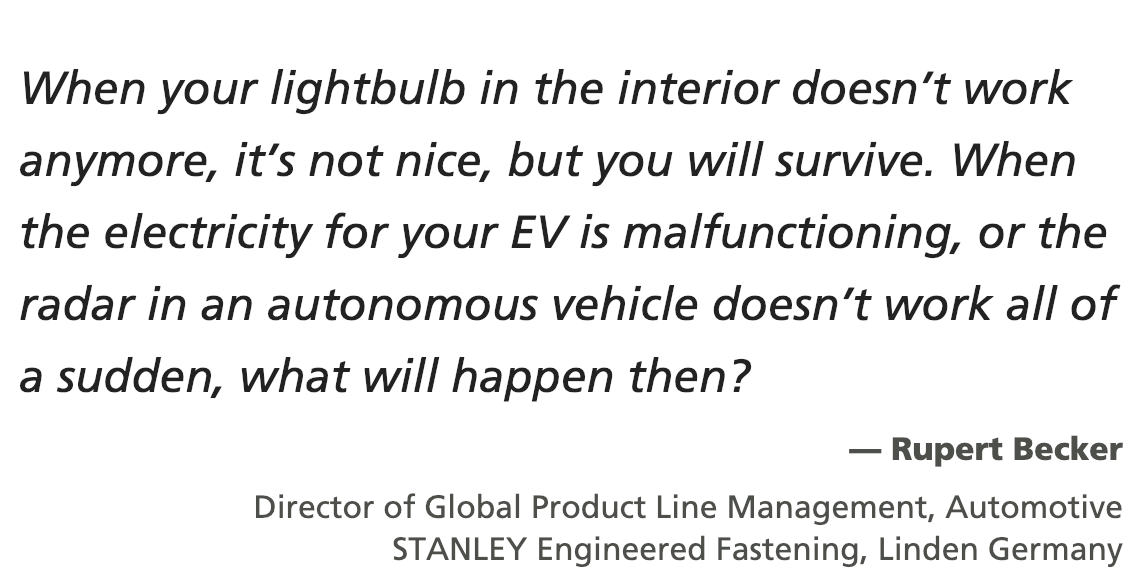Fastener Industry Responds To EV Market Demands


Numerous industries are clamoring to address cutting-edge issues surrounding electric vehicles, and the fastener industry is no exception.
Sweden-based Bulten AB recently strengthened its electric vehicle full service provider portfolio through the award of a further contract from a major European automotive manufacturer, according to Fastener + Fixing Magazine.
“The award of a second Electric Vehicle FSP contract in a short space of time confirms that the approach and expertise Bulten brings to this field is recognized and appreciated by major OEMs within the automotive industry,” stated CEO Tommy Andersson.
The contract is initially valued at EUR 5 million (US$5.7 million) per annum and then follows the vehicles volume curve. Deliveries are expected to start September 2020 and are expected to increase up to full capacity in 2021 and continue for five years.
Plug-in electric cars still represent just under 2% of the US market, and 2.2% worldwide, according to Quartz.com. Despite exponential growth, with a record 2 million or so EVs sold worldwide last year, only one in 250 cars on the road is electric.
An electric vehicle, also called an EV, uses one or more electric motors or traction motors for propulsion, according to Wikipedia. EVs include road and rail vehicles, surface and underwater vessels, aircraft and spacecraft.
Switzerland-based Bossard Group is another fastener company with a presence in the EV market.
In the U.S., Bossard saw “new momentum” in 2018, with full-year sales rising 9.4% to CHF 240.9 million.
“Our cooperation with the largest US electric vehicle manufacturer (Tesla) also contributed positively to the acceleration in demand in the second half of the year. This customer significantly increased production of its third model series.”
 Half of almost 1,000 automotive industry decision makers surveyed in Europe, Asia, and the Americas believe battery electric vehicles are the No. 1 trend in their sector, up from the No. 3 spot in 2016 (and up from the No. 9 spot in 2015), according to KPMG’s Global Automotive Executive Survey 2017. Fuel cell EVs ranked as the No. 3 trend in the current survey; and hybrid electric vehicles were No. 4.
Half of almost 1,000 automotive industry decision makers surveyed in Europe, Asia, and the Americas believe battery electric vehicles are the No. 1 trend in their sector, up from the No. 3 spot in 2016 (and up from the No. 9 spot in 2015), according to KPMG’s Global Automotive Executive Survey 2017. Fuel cell EVs ranked as the No. 3 trend in the current survey; and hybrid electric vehicles were No. 4.
To support growing demand for more efficient EVs, Stanley Engineered Fastening works with OEMs to develop fastener and assembly solutions that complement electric car manufacturing distinctions, such as replacing steel fasteners with lighter, aluminum ones; developing self-piercing rivets; and perfecting stud welding.
“To reduce the weight of cabling, a major component of a vehicle’s wire harness, manufacturers want to switch from standard 24V cable connections to bus cables, which are much smaller, lighter in weight and faster,” says Vahid Amirzadeh, European senior product manager for Stanley Assembly Technology.
Providing better solutions for electrical grounding is critical in EVs because electric current won’t flow unless it has a path to return to its source. In older vehicles with metal frames and steel bodies, components were bolted together with very little insulating material separating them, so there were adequate paths to ground.
In new vehicles, however, there is more insulation between components and the chassis, and bodies are made of a combination of conductive, poorly conductive and non-conductive materials.
“When your lightbulb in the interior doesn’t work anymore, it’s not nice, but you will survive,” says Rupert Becker, director of Global Product Line Management – Automotive for Stanley Engineered Fastening in Linden, Germany. “When your electricity for the EV is malfunctioning, or your radar in an autonomous vehicle doesn’t work all of a sudden, what will happen then?”


There are no comments at the moment, do you want to add one?
Write a comment